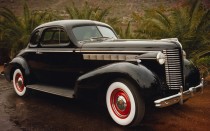My good friend is a passionate enthusiast who happens to own an important classic car that is completely restored. The quality of the restoration is first class in every way and he has won at every event at which he entered the car. A few years ago, he was also invited to display the car at The Quail and that says something about the quality of the workmanship. He recently mentioned that he might consider selling the car and mentioned a price that he believed had been achieved by a reputable dealer on the sale of a similar vintage car.
Despite what might seem like a valid comp sale there is no assurance that our friend’s car will achieve the same amount. For one thing, the dealer he mentioned is known to sell cars of notable provenance and even his un-restored cars usually have comprehensive and impressive ownership history unlike my friend’s car.
So our advice is that if the car needs to be sold he should seriously consider either an auction or utilize a reputable dealer who carries important cars. Many dealers will write you a check for the car. Or they may agree to take it on consignment. Some dealers arguably provide liquidity to the market (by buying cars from sellers) although perhaps not quite at the lofty price that’s in your head. However, there is amazingly fierce competition amongst dealers to attract a dwindling supply of the best classic cars. The dealer’s advantage is that they are always talking to buyers about their needs and so they are in a position to instantly know what to pay when they are buying cars. If there is sufficient headroom for an arbitrage position the dealer will cut a deal; so just keep the discussion going if the first price offered is below your number.
Many sellers are irrationally fixated on the dealer’s or auction house’s commission. But the dealer/auction house is actually performing a valuable service and that is worth the fee that they earn. That dealer just might know someone who immediately wants the car badly enough to pay a high price.
In our view chances are slim that our friend is going to be handed a check for several hundred thousand dollars in a private sale. Could happen, but our information is that such buyers may prefer to deal with dealers, specialist brokers and auction companies. Well known dealers spend a lifetime cultivating relationships with high-end buyers and they have the resources and incentive to thoroughly check out and prepare their offerings. The very personal relationships between such specialist dealers and their network of customers is often severely underestimated. My observation is that the top dealers, the top auction companies and their customers sit should to shoulder at auctions and other events and many know each other well from being in the ecosystem for a long time.
Classic and collector car auction companies also provide similar services and add the benefit of substantial marketing efforts and publicity campaigns. Massive publicity serves a marketing purpose but also creates a durable forum in which the public has an opportunity to shed light on dubious history. Buyers of important cars are keenly interested in making unassailable decisions with particular emphasis on history, condition, documentation, authenticity and clear titles. Indeed, condition may be the most easily verified of all these factors.
The right auction event should result in multiple bids for the car and ultimately that is what makes the market. The market is not one person willing to buy but several people making multiple offers. A high priced important car might garner interest from only two or three people in the entire world; so choice of venue is critical if multiple offers are to be achieved. Such buyers tend to avoid cars with “stories”.
Sellers should be prepared for the reality that at any given time, the perfect buyer (a) has not yet discovered the car, (b) has already made a purchase to fill that hole in the collection, or (c) is awaiting the proper venue to make a purchase. The excitement of buying at auction should not be misunderstood for irrational behavior. It may seem irrational to some but it is a legitimate ecosystem that cannot be denied. Sellers would be wise to prepare their cars accordingly.
The vintage car world has its share of fakes and compromised cars. The buyer’s worst nightmare is to discover inconsistencies or horror stories after writing a check. The best dealers and auction companies will actually highlight flaws in pursuit of shedding daylight on any questionable aspects of the car. If your car has a story, you ought to disclose it. If the issues with the car are not flaws but changes from the original build, disclose all of it. You will feel better and buyers will appreciate the information.
Good luck and happy motoring.
Terry Sullivan
Los Angeles, CA
